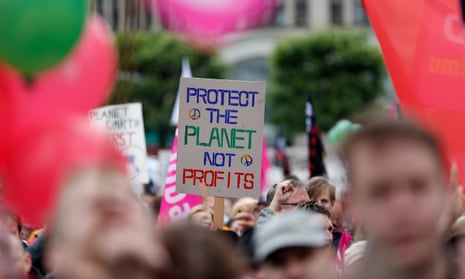The G20 nations provide four times more public financing to fossil fuels than to renewable energy, a report has revealed ahead of their summit in Hamburg, where Angela Merkel has said climate change will be at the heart of the agenda.
The authors of the report accuse the G20 of “talking out of both sides of their mouths” and the summit faces the challenge of a sceptical US administration after Donald Trump pulled out of the global Paris agreement.
The public finance comes in the form of soft loans and guarantees from governments, and, along with huge fossil fuel subsidies, makes coal, oil and gas plants cheaper and locks in carbon emissions for decades to come. But scientists calculate that to keep global warming below 2C, most fossil fuel reserves must be kept in the ground, requiring a major shift of investment to clean energy.
The new report by a coalition of NGOs found that the G20 countries provided an average of $71.8bn of public finance for fossil-fuel projects per year between 2013-2015, compared with just $18.7bn for renewable energy. Japan provided the most at $16.5bn per year, which was six times more than it allotted for renewables.
China, which is curbing its coal use and increasingly being seen as a climate leader, provided $13.5bn for fossil fuels but just $85m for green energy. Germany, also seen a climate leader, provided $3.5bn of public finance for fossil fuels, compared with $2.4bn for renewables.
Britain provided $972m for fossil fuels, compared with $172m for renewable energy.
“When the G20 countries committed to the Paris agreement, they made a pact with the world that they would take meaningful steps to reduce their carbon emissions in an effort to avert the worst effects of the climate crisis,” said Nicole Ghio of the Sierra Club, one of the groups that compiled the report. “But as we now know, these countries have been talking out of both sides of their mouths. It’s unconscionable that any nation would continue to waste public funds on fossil fuels when clean energy sources are readily available [and] more cost-effective and healthier for families and communities across the globe.”
“G20 leaders may like to talk about climate, but it’s clear their talk is cheap,” said Kate DeAngelis at Friends of the Earth US, another group behind the report. “While praising each other for investing in renewable energy at home, they bankroll billions of dollars for dirty fossil fuel projects in developing countries.
Ahead of the G20 summit in Hamburg on 7 and 8 July, Merkel made clear that action on climate change was high on the agenda. “Since the decision of the US to quit the Paris climate agreement, we are more determined than ever to make it successful,” she said. “We must tackle this existential challenge, and we cannot wait until every last person on earth has been convinced of the scientific proof.”
However, both the G20 and G7 groups have found it difficult to turn previous pledges on fossil fuel subsidies – which run at $10m a minute, according to the IMF – into action. In 2009, the G20 said it would phase out fossil fuel subsidies, noting that doing so by “by 2020 would reduce global greenhouse gas emissions in 2050 by 10%”.
But by 2016, the G20 had still failed to set a target date for the phase-out, despite the urging of the world’s 49 countries most vulnerable to climate change and of global investors controlling $2.8tn in funds. The G7 set 2025 as the date to end fossil fuel subsidies in 2016 but this was dropped in 2017, after the Trump’s US administration would not join other G7 leaders in support of climate action.
The new analysis found two G20 countries – Russia and Argentina – provided zero public financing for green energy, but more than $1bn each for fossil fuels.
The report was produced by Oil Change International, Friends of the Earth US, the Sierra Club and WWF Europe. It included energy funding from multilateral development banks, such as the World Bank, in which the G20 have significant voting shares and this accounted for a quarter of the total. The renewable category did not include nuclear energy or large hydro dams, but even with these included fossil fuel financing was still far bigger.

Comments (…)
Sign in or create your Guardian account to join the discussion